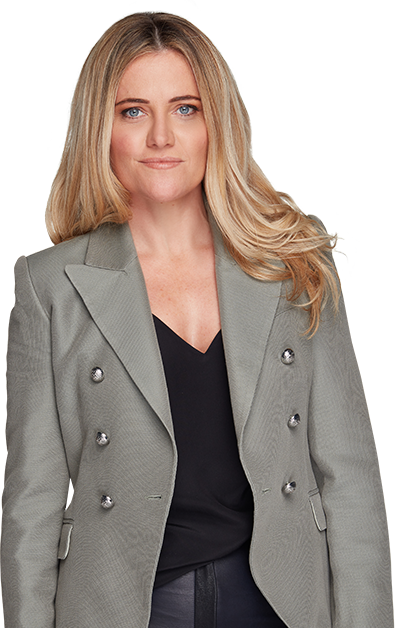PERI-MENOPAUSE
Sarah, interior stylist
“I had both my babies by age 32, so I didn’t have to worry about my fertility clock ticking away. “I did, however, recently notice feeling ‘wired but tired’ – glaring at alarm clocks at night, but feeling zoned-out during the day. “I also had very gritty eyes, bloating, and my husband frequently joked I was turning into a grumpy old cow, I would always forget what I came to the pantry for, and frequently mixed up my Kids’ names. I guess that’s why some women have coined the term ‘the memory pause’.”

The expert says: “After analysing Sarah’s diet, we cut out pretty much all processed foods and alcohol, to balance hormones” says Sydney naturopath Victoria O’Sullivan “Reducing sugar helped with gritty eyes.” I also put Sarah on a MenstroCare supplement, which contains the herb vitex agnus castus, to help balance the important hormones oestrogen and progesterone. This also helped regulate Sarah’s cycle from less than 26 days to a more regular 28 days”
Top perimenopause foods:Essential fatty acids in food like fish, linseeds and chia seeds provide anti-inflammatory action important for hormonal balance.” Says Victoria.
MENOPAUSE: THE FACTS
• Menopause is the permanent cessation of menstruation. The average age is 52.
• Symptoms can last two to 10 years.
• Menopause signs include cycles that are heavier or lighter. Periods may initially come closer together, then spread cut and finally stop
• Sixty per cent of women have mild to moderate symptoms, including hot flushes and sleep issues.
• A high percentage of women have a similar onset time and symptoms to their mums.
• Dietary changes can help. Avoid spicy foods and hot drinks, reduce coffee and alcohol.

MENOPAUSE
Lisa, director and jewellery designer
“I had very painful, lumpy breasts, couldn’t shift the weight and had a lot of heart palpitations and trouble sleeping.
“I learned diet is hugely important because, although were living in a modern era, our bodies are programmed to be like cavewomen. In other words, we should be eating fruits and vegetables, and protein like fish and meat, rather than anything you can buy in a box or that has a lot of carbs. I cut out coffee and reduced my red wine intake to three glasses a week.
“The good news is now I’m 3kg lighter, and after just four weeks my boobs are my ‘breast friends’ not my mortal enemies’ ”
The expert says: “Along with vitex agnus-castus, we put Lisa on an indole supplement. “indoles are found in the broccoli family and optimise oestrogen metabolism via the liver, which helps with lumpy breasts”
Top menopause foods: “Essential fatty acids, food from the broccoli family as well as vitamin B foods to help reduce hormonal bloat. Beef, chicken, lentils and chickpeas are great.”
GOING DOWN THE HRT ROUTE
While some women prefer the natural approach, others say hormone replacement therapy has been their saviour. Here’s what you need to know.
What is HRT?
Hormone replacement therapy is medication containing hormones the no longer produces after menopause – oestrogen and progesterone. Combined HRT is recommended for women who still have a uterus, while oestrogen only HRT is for those without.
What are the risks and benefits?
“HRT does not affect weight gain, headache or migraine, according to studies”
says Brisbane ,gynaecologist Dr Gino Pecoraro “It reduces hot flushes, urinary symptoms, sleep problems the risk of fractures and can even protect against colorectal cancer. On the downside, there is a very small increased risk of blood clots, stroke and breast cancer”
How great is the breast cancer risk?
“Our research has shown that five years of combined HRT in a 50 –year-old increases the risk of breast cancer from 5.1 to 5.3 per cent by [age] 80 says Professor John Boyages, director of the Macquarie- University Cancer Institute.
How long should I take HRT?
Some women flush for life and the quality of life without HRT is so poor, they take HRT for
long periods” says Dr Pecoraro “However, two to five years is the recommended time”
If family history of breast cancer is a concern, non-hormonal options exist. Dr Pecoraro says. “It always amazes the, though, that people worry about HRT and breast cancer, yet drink two or three glasses of wine a day which is a much greater risk factor than HRT.”
POST-MENOPAUSE
Anne Maree, corporate trainer
 “I’ve been having hot flushes for eight years now – sometimes 25 times a day before I sought treatment! I literally thought I was melting. I didn’t want to go on HRT, so I opted for the naturopathic route.
“I’ve been having hot flushes for eight years now – sometimes 25 times a day before I sought treatment! I literally thought I was melting. I didn’t want to go on HRT, so I opted for the naturopathic route.
“Weight gain and moodiness were also big problems. I felt like a stranger had taken over my mind. I would be happy one minute, then start weeping the next. But the flushes were the worst -I could only sleep with a sheet, even when my husband was freezing and covered in blankets. ‘These days, though. I only have five, very manageable, hot flushes”
The expert says “Black cohosh formula helped balance oestrogen. We also focused on hone health and reducing carbs to get the weight down”
says Victoria
Top post menopause foods
“Calcium rich foods such as green leafy veg, sardines, tuna, tofu, almonds and sesame seeds are good for bones. Sage tea can help with Sweating”
SPREAD THE LOVE

I'm Victoria
FOUNDER OF VITALISE WELLNESS, A COMPANY DEDICATED TO PROVIDING PREVENTATIVE HEALTH CARE TO THE COMMUNITY.
Latest posts

The Upgraded Life
A Free 7 Day training with Victoria
To Get Your Brain, Your Body and Your Heart all Pointing in the Direction of Your True Health Potential.
You will also receive informative, inspiring, life changing content along with our latest offers. Don’t like it? No problem you can unsubscribe with a click.
